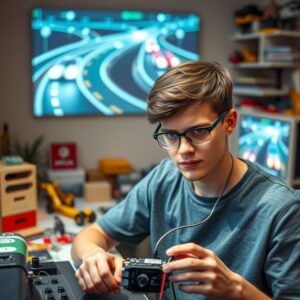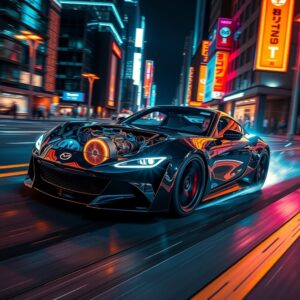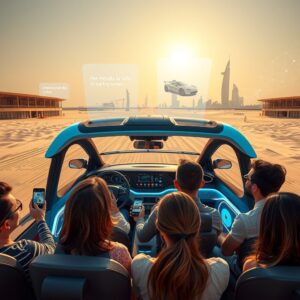
TESLA TAKES THE WHEEL: Supervised Full Self-Driving Comes to Cybertruck
In a groundbreaking move, Elon Musk’s electric vehicle behemoth has taken the wraps off its Supervised Full Self-Driving (FSD) feature for the Cybertruck. This highly anticipated update allows the vehicle to drive itself in certain situations, marking a significant milestone in Tesla’s efforts to advance its self-driving capabilities.
According to reports from within the Tesla fan community, the first batch of FSD updates was rolled out to Cybertruck owners on September 30th, with some users already testing the feature in real-world scenarios. The update includes several new features, including the ability for the vehicle to detect and respond to road hazards such as pedestrians or other vehicles.
A GLIMPSE INTO THE FUTURE
One notable example of the FSD system in action was shared by a Tesla fan account on Twitter, which showed the Cybertruck navigating through traffic without incident before suddenly requiring the driver’s intervention to avoid hitting a median after making a left turn. This glimpse into the future of transportation has sent shockwaves throughout the industry, with many experts hailing it as a major breakthrough in autonomous driving technology.
But as we marvel at the advancements being made by Tesla and other companies in the field of autonomous vehicles, we cannot help but wonder about the implications of such technology on our society. Will we be able to trust machines to navigate our roads without human oversight? Or will we be forced to confront the darker aspects of innovation head-on?
A DOUBLE-EDGED SWORD
The release of FSD for the Cybertruck comes just ahead of Tesla’s planned reveal of its robotaxi concept, a fully autonomous vehicle designed for ride-hailing services. While the exact details of the robotaxi are still unclear, many industry observers believe that it will play a key role in the development of autonomous driving technology.
However, beneath this gleaming surface of innovation lies a stark reality. The same company that has pushed the boundaries of technological advancement is also grappling with fundamental issues of safety and reliability. The recent recall of 27,000 Cybertrucks due to a potential issue with the rearview camera system serves as a stark reminder of the perils of hasty innovation.
A PATTERN OF QUALITY CONTROL ISSUES
The fact that this is not Tesla’s first foray into the world of recalls is both astonishing and unsettling. From loose trim pieces to defective windshield wipers, and now sticky accelerator pedals and faulty rearview cameras, it seems as though the company has been embroiled in a never-ending cycle of quality control issues. It’s difficult not to wonder whether Tesla’s relentless pursuit of innovation has come at the expense of its commitment to safety.
The timing of these recalls is particularly intriguing. As the electric vehicle market continues to grow, companies like Tesla are under increasing pressure to deliver reliable and safe products. With five recalls in under a year, it’s clear that Tesla still has some work to do if it wants to meet these expectations.
A FUTURE OF UNMITIGATED RISK?
As we navigate this treacherous landscape, one thing is clear: Tesla must prioritize quality and safety above all else if it wants to remain a leader in the electric vehicle market. The company’s ability to balance innovation with caution will be put to the test in the coming months and years.
But even as we grapple with these questions of safety and reliability, there remains a deeper issue at play. Are we truly ready for a future where machines are empowered to navigate our roads without human oversight? Or are we merely sleepwalking into a world of unmitigated risk, with little regard for the consequences?
A DOUBLE NARRATIVE OF INNOVATION AND RECKLESSNESS
The FSD update represents a major milestone in Tesla’s efforts to develop autonomous driving technology. But it also serves as a stark reminder that we are still far from fully understanding the implications of this technology on our society. As we hurtle towards a future where machines and humans coexist on our roads, one thing is certain: we will be forced to confront the darker aspects of innovation head-on.
And so, we are left to ponder the paradox at the heart of Tesla’s latest developments. While the company continues to push the boundaries of technological advancement, it must also navigate a complex web of safety concerns and quality control issues. The stakes have never been higher, and the implications have never been more far-reaching.
THE FUTURE OF TRANSPORTATION: A DOUBLE-EDGED SWORD
As we embark on this uncertain journey into the future, one thing is clear: only time will tell whether Tesla’s pursuit of innovation will ultimately prove to be its greatest strength or its greatest weakness. The FSD update represents a major milestone in the development of autonomous driving technology, but it also serves as a stark reminder that we are still far from fully understanding the implications of this technology on our society.
The future of transportation is a double-edged sword: on one hand, it holds the promise of revolutionizing the way we travel and interact with each other. On the other hand, it presents a world of unmitigated risk, where machines and humans coexist on our roads without fully understanding the consequences of their actions.
As we hurtle towards this uncertain future, we are left to ponder the paradox at the heart of Tesla’s latest developments: will innovation prove to be its greatest strength or its greatest weakness? Only time will tell.







Rowan makes some valid points, but I think she’s still underestimating the true scope of Elon’s ambition – he’s not just building cars, he’s redefining the entire notion of risk itself. And as far as Russian roulette goes, at least with autonomous driving, it’s not like we’re putting our lives in the hands of a charming sociopath with a gun.
I’d say that’s a fair point Cali, but I still think Rowan hit on something essential – Elon’s willingness to push boundaries often comes at the cost of ignoring more pressing concerns. His notion of ‘redefining risk’ sounds like a euphemism for ‘accepting a higher risk threshold’. Don’t get me wrong, Tesla has achieved some impressive milestones, but I’m not convinced that autonomous driving is as safe as we’re being led to believe.
I remember when driving was an art form, not just a mindless routine. As I gaze upon this Cybertruck with its FSD feature, I’m taken back to the days of my father’s 1969 Mustang, where every drive was a thrill and every mile was a journey. Now, with autonomous vehicles taking the wheel, are we sacrificing that sense of freedom and adventure for a fleeting convenience? Will we ever be able to truly trust these machines, or will they forever change the very fabric of our driving experience?
Are we about to witness a new era of military coups in West Africa, all thanks to a shiny new highway? As Ecowas looks to breathe new life into the region with this super highway, I can’t help but wonder if it’s just a recipe for disaster. Meanwhile, Tesla is busy taking the wheel on autonomous driving, but are we ready for the risks that come with it? It’s a double-edged sword, and only time will tell if innovation will be our savior or our downfall.
I am absolutely appalled by the lack of quality control measures in place at Tesla, and it’s alarming that they’re pushing forward with autonomous driving technology despite these issues. How can we trust machines to navigate our roads without human oversight when even basic recalls like the recent Cybertruck issue are happening repeatedly?